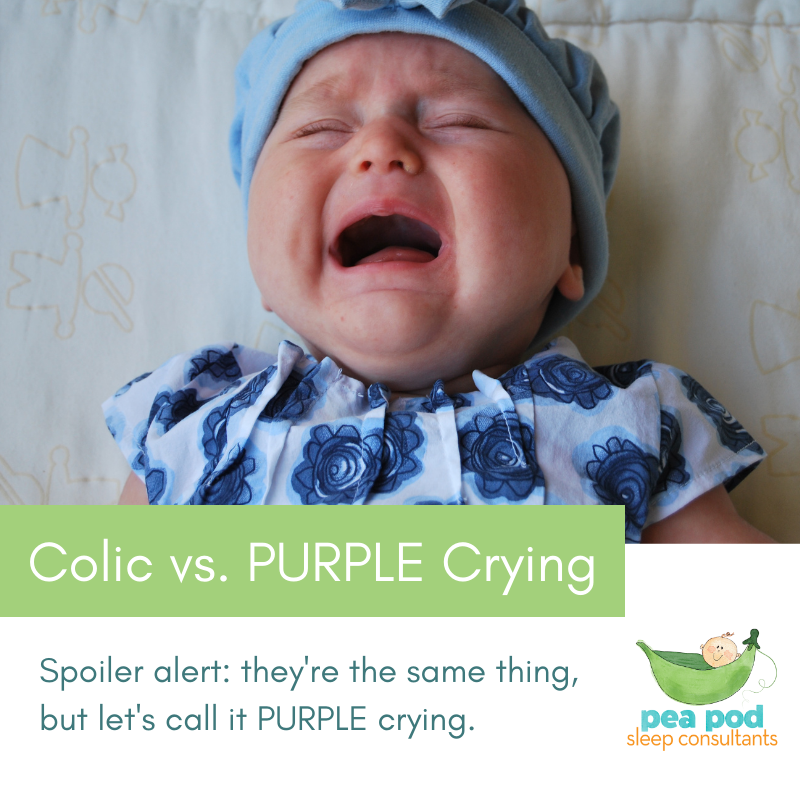Reflux can cause baby sleep challenges but not all baby sleep challenges are due to reflux. When it comes to reflux, there can be a bit of confusion regarding symptoms, causes and treatment. Let’s get the facts straight!
What is reflux?
There are two types of reflux. There’s GER or Gastroesophageal Reflux, also known as just reflux and then, there’s GERD or Gastroesophageal Reflux Disease.
Reflux can start as early as a few weeks of age but, usually, starts between two and four months. This is generally the time that infants start consuming larger amounts of breastmilk or formula.
GER is quite common. With GER your baby’s milk & other stomach contents back up into the esophagus. Sometimes, you might see it come out through the mouth or nose. GER starts to ease up at six months and usually resolves by nine to 12 months. GER diminishes at this time for a few reasons: 1) the muscle between the esophagus and stomach (the esophageal sphincter) tightens up; 2) most babies start sitting up and 3) most babies begin eating solid foods. All of these factors make it harder for baby’s food to work against gravity to come back up.
While GER is common, GERD is not so much. It is similar to GER in the fact that it causes baby’s food to come back up. The difference is that GERD results in complications. GERD causes inflammation of the esophagus and/or oropharynx. If GERD is not managed , it can lead to more serious complications such as airway problems (wheezing, gagging or difficulty breathing), poor feeding and inadequate weight gain.
Due to the acidity of stomach contents, both GER and GERD can cause discomfort.
How do you know if your baby has GER?
Common symptoms of GER include the following:
- Spitting up or vomiting after feedings
- Fussiness, irritability
- Back arching, head thrusting
- Difficulty self-soothing and falling asleep
Some babies have “silent reflux”. With silent reflux, a baby won’t necessarily spit up or vomit but this type of reflux can result in inflammation of the esophagus and an uncomfortable baby.
If you notice these symptoms, check with your pediatrician. Your pediatrician will also be able to figure out if your baby has reflux or an allergy to milk or formula, which is another possibility with the same symptoms.
Many parents get concerned if they see their baby spitting up regularly. But, that’s normal! If they aren’t bothered by it, your little one is probably just a “happy spitter”!
How can you help your baby’s discomfort?
- Feed your baby smaller amounts more often.
- Burp you baby frequently while feeding.
- Hold baby upright for 15 – 30 minutes after every feeding.
- If your baby is bottle feeding, make sure that the size of the bottle’s nipple hole is appropriate for your baby.
- If the hole is too small, your baby will swallow too much air.
- If the hole is too large, your baby can take in too much fluid.
Could reflux be the reason your baby isn’t sleeping well?
If your baby falls asleep while feeding, rocking, swinging or bouncing, and wakes up regularly, those wake-ups are likely due to a sleep association. If you’re putting baby down calm, but still awake, an occasional wake up might be due to reflux.
While many parents used to think wedges or inclined sleepers helped babies with reflux, wedges and inclined sleepers are not safe. The American Academy of Pediatrics does not recommend inclined sleepers for reflux. The use of these products has resulted in death.
Can medication or diet help?
“The good news about reflux”, says Dr. Tim Marsho from Tosa Pediatrics, “is that it almost always gets better without any intervention at all.”
If you do need to make changes, your pediatrician can guide you.
With all the different formula options out there, they might recommend trying a different option. If you’re nursing, your doctor may suggest tracking your diet and limiting anything that seems problematic.
According to Dr. Marsho, reflux medication is used much less frequently than years ago. “There is growing evidence that medication does not help as much as we once thought it did. In fact, there are safety concerns with long-term use of medications. If we have to resort to medication, it’s only for a very short period of time.”
While reflux can be a nuisance for babies and very stressful for parents, it is normal. Dr. Marsho reassures parents that “it is not a medical problem”. In most cases, it resolves by nine to 12 months. You and your pediatrician will figure out the best way to address this temporary nuisance. If your baby’s intake is inadequate, weight gain is insufficient or there are compromising respiratory issues, your pediatrician may recommend further diagnostic testing. Fortunately, this is a much less common scenario.



